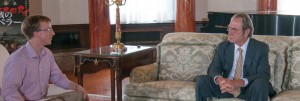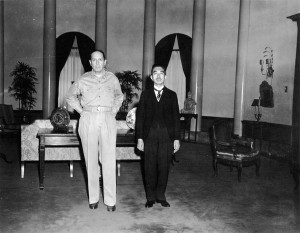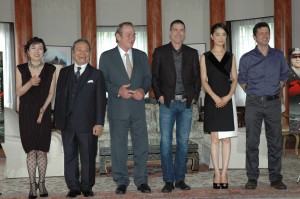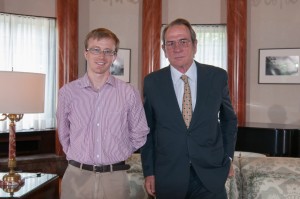 I was filled with a mixture of excitement and nervousness as I waited outside the Great Room in the Ambassador’s Residence. Inside, giving an interview on the upcoming release of his film Emperor, was the one and only Tommy Lee Jones, and I was next in line to interview him for American View. The Great Room holds special historical significance to U.S.-Japan relations because it is where the famous photograph of General MacArthur and Emperor Hirohito was taken in 1945. In fact, members of the film production company came here to take photos of the Great Room over two years ago in order to build a set as close to the original as possible to reenact the scene in the film. This room was also used as a backdrop for a press event to promote the movie, which features an all-star cast of American actors including Tommy Lee Jones and Matthew Fox, as well as Japanese actors such as Toshiyuki Nishida and Kaori Momoi.
I was filled with a mixture of excitement and nervousness as I waited outside the Great Room in the Ambassador’s Residence. Inside, giving an interview on the upcoming release of his film Emperor, was the one and only Tommy Lee Jones, and I was next in line to interview him for American View. The Great Room holds special historical significance to U.S.-Japan relations because it is where the famous photograph of General MacArthur and Emperor Hirohito was taken in 1945. In fact, members of the film production company came here to take photos of the Great Room over two years ago in order to build a set as close to the original as possible to reenact the scene in the film. This room was also used as a backdrop for a press event to promote the movie, which features an all-star cast of American actors including Tommy Lee Jones and Matthew Fox, as well as Japanese actors such as Toshiyuki Nishida and Kaori Momoi.

During the interview, I was surprised to learn that Jones developed an interest in Japan when he studied traditional forms of drama at university. “I took a course in the history of world drama and was fascinated with Kabuki and Noh. What I’d read about it and the papers I wrote also intrigued me and my interest in Japanese culture began to grow. The more I learned, the more I wanted to learn,” remarked Jones. He also talked about his memories of General MacArthur and his hope for U.S.-Japan relations to remain strong while promoting open cultural exchanges. Lastly, he offered this advice for young Japanese who want to learn more about the U.S. or U.S.-Japan relations: “Read more books and do more travelling.” Based on my experience travelling and teaching English in rural Japan with the JET program, I could not agree more.

After the interview, Jones proceeded to the dining room to have lunch with the Ambassador and other members of the cast and crew of the movie. Seeing prominent American and Japanese actors socializing with top embassy officials made me reflect on the progress that has been achieved in U.S.-Japan relations since the photograph of General MacArthur and Emperor Hirohito was taken in the same building almost 70 years ago. Back then, there was no guarantee that the U.S. and Japan would maintain friendly diplomatic relations, so to see American and Japanese actors engaged in a film that examines the beginning of the mutual relationship in a non-political way was truly moving for me. Jointly-coordinated projects like this film are a symbol of the positive relations between the U.S. and Japan and I am extremely honored to have the chance to contribute to strengthening these relations through my work at the Embassy.
 Matthew Wright was the Press Office 2013 summer intern at the U.S. Embassy in Tokyo. He is a second year graduate student at Vanderbilt University where he will earn his Master of Education in Higher Education Administration. He graduated from Cornell University in 2009 with degrees in Government and Asian Studies and proceeded to teach English in Wakayama Prefecture for three years on the Japan Exchange & Teaching (JET) program.
Matthew Wright was the Press Office 2013 summer intern at the U.S. Embassy in Tokyo. He is a second year graduate student at Vanderbilt University where he will earn his Master of Education in Higher Education Administration. He graduated from Cornell University in 2009 with degrees in Government and Asian Studies and proceeded to teach English in Wakayama Prefecture for three years on the Japan Exchange & Teaching (JET) program.







COMMENTS2
マシューさん、はじめまして。
トミー・リー・ジョーンズさんは「逃亡者」からのファンですが、今回の「終戦のエンペラー」については戦後GHQの東京裁判等に関心があったので早々に見に行きました。
1つ1つの台詞の意味が理解できる程私自身が大東亜戦争に関心を持っていた事、米国の作品にもかかわらず当時の日本の状況を理解する台詞が有った事を驚きました。
これからを生きる物として子供たちに何を伝えていかなければならないかと言えば、事実をきちんと伝え「歴史は続いている」という事も伝えなければなりません。
この映画はそういった意味で子供にも勧められる作品でした。
これからの世界は1国のみの利益の追求では立ちいかなくなります。どうか世界が共に利益を得、共生できる国づくりをしていただきたいと願うばかりです。
私はLOSTの大ファンで、マシュー・フォックスさんに目がいってしまいました。この部屋は私達日本人にとってとても重要な場です。
Dマッカーサー閣下と昭和天皇のこの写真から、1920年にかじった民主主義を、その20年間にわたる反動を経て、再び立ち戻った場所だからです。以後、私達の国は、自由と民主主義を標榜する法治国家として、西側の一員として歴史を重ねています。8月15日の敗戦の日を前にライトさんの素敵なレポート、改めて感銘受けました。
LEAVE A COMMENT
TOP